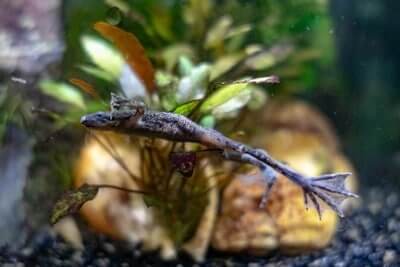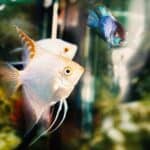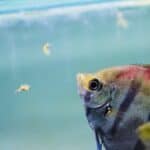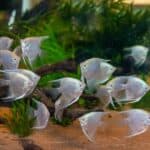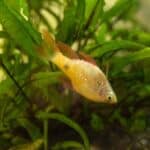African dwarf frogs are an exciting addition to a tropical aquarium.
Owners enjoy them for their entertaining and lively personalities. While African dwarf frogs get along with some fish, are angelfish and African dwarf frogs compatible as tank mates?
African dwarf frogs and angelfish have similar water and pH requirements, but their tank needs are incompatible. Frogs need wide, shallow tanks, while angelfish prefer a taller, deeper aquarium.
Another problem is that angelfish are diurnal, while African dwarf frogs are nocturnal.
African frogs are slow eaters who enjoy a primarily meat-based diet, meaning angelfish will compete with them for food. Frogs won’t get the essential nutrients they need to stay healthy.
The good news is that angelfish and African dwarf frogs are unlikely to eat each other, but frogs are prone to eating fry, which is a problem for owners intending to breed their angelfish.
Can I Put Dwarf Frogs with Angelfish
African dwarf frogs are peaceful frogs that are popularly placed in aquariums alongside fish.
There are four different species:
- Hymenochirus boettgeri, which is native to the Central African Republic, the Democratic Republic of the Congo, Gabon, Equatorial Guinea, Nigeria, and Cameroon.
- Hymenochirus boulengeri, which is native to the northeast of the Democratic Republic of the Congo.
- Hymenochirus curtipes, which is native to the Republic of Congo.
- Hymenochirus feae, which is native to Gabon.
They look similar, but their native locations differ. African dwarf frogs reach approximately three inches in size and weigh only a few ounces, so they’re tiny creatures.
African dwarf frogs also prefer to live in small groups of around two or three. They’re sociable creatures that do better with their kind.
While they’re compatible with several tropical fish, not all species are ideal tank mates for African dwarf frogs. Unfortunately, this includes angelfish.
We’ve measured their compatibility below to see whether they could get along.
Tank Conditions
African dwarf frogs are happy to live in temperatures between 72 to 82°F and enjoy a pH between 6.5 to 7.5. Similarly, angelfish also prefer warm temperatures that range from 74 to 84°F. The pH levels should be between 6.8 and 7.8.
If you meet somewhere in the middle with your tank’s temperature and pH levels, African dwarf frogs and angelfish can comfortably live in the same tank.
African dwarf frogs can also live with sand or gravel substrate, which angelfish do best with. However, the gravel must be large enough for African dwarf frogs not to swallow, and the sand must be fine enough not to cause problems.
However, if you keep African dwarf frogs, the area above the tank must be kept humid. If your frogs manage to jump out of the aquarium (which is likely) and it’s too dry, they’ll dehydrate and die.
Tank Size
African dwarf frogs and angelfish aren’t entirely compatible with their ideal tanks.
That’s because angelfish grow tall, so they prefer to be in tall tanks over wide ones where they have plenty of room to develop.
African dwarf frogs have fully functioning lungs.
They don’t consume dissolved oxygen through their gills as angelfish do, but they swim to the surface to breathe in the oxygen they need. This means they prefer shallower tanks with a greater surface area.
Angelfish that are in unsuitable tanks are at risk of:
- Stunted growth.
- Stress-related aggression.
- Stress.
- Ammonia poisoning.
- Reduced oxygen levels.
- Bacterial diseases.
- Health conditions associated with poor water quality.
This means that housing your angelfish in a tank best suited to African dwarf frogs can be problematic and cause them to become uncomfortable.
Sleeping Pattern
African dwarf frogs are nocturnal, so they sleep during the day and come out at night. In comparison, angelfish are diurnal, which means they’re more active during the day and sleep at night.
This means they’re likely to disturb each other while trying to sleep.
While you can combat this by providing plenty of hiding spaces for African dwarf frogs and angelfish to shelter in while they rest, their activity levels may cause a problem for their tank mates.
Similarly, due to these contrasting sleeping patterns, feeding times can get complicated, throwing their routines out of sync.
Angelfish and African dwarf frogs will be tempted enough by food to wake up, meaning they may adopt an unusual and broken sleeping routine to ensure they don’t miss out on a treat.
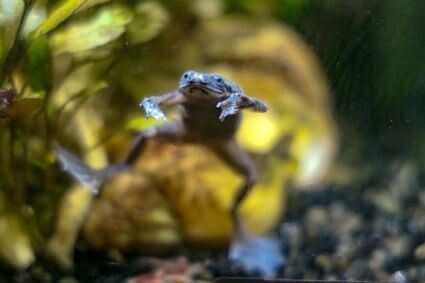
Diet
Captive angelfish tend to eat high-quality fish flakes or pellets, depending on their preference. Occasionally, they can have fruits and vegetables as a treat to improve their vitamin and mineral levels.
However, they much prefer meaty foods and enjoy a range of insects and worms from time to time.
Worms and insects are so high in fat that they’re unsuitable for angelfish too often. That’s because it puts them at risk of obesity and other fat-related health problems.
African dwarf frogs eat a meat-based diet consisting of:
- Mosquito larvae.
- Bloodworms.
- Brine shrimp.
- Krill.
- Earthworms.
- Fish fry.
- Beef heart.
This means that angelfish will compete with the frogs for food, which they will likely prefer over their usual pellets and flakes.
As African dwarf frogs are smaller than angelfish and much slower eaters, they may miss out.
Will Angelfish Eat African Dwarf Frogs?
Angelfish are well known for being the more peaceful member of the cichlid species. However, as described by Biology Open, male cichlids are classed as either subordinate or aggressive.
This means that some angelfish are more prone to aggression than others.
Which camp they fall into all comes down to personality, which you, unfortunately, won’t have a gauge on until the fish is in the same tank as the African dwarf frogs.
However, it’s unlikely that angelfish will attempt to eat African dwarf frogs. Frogs aren’t a natural food source for angelfish, and they prefer worms, brine shrimp, and tiny feeder fish.
That said, angelfish sometimes eat small community fish they can put in their mouth. Fish that are two inches or smaller are most commonly at risk.
As we’ve already mentioned, dwarf frogs tend to reach around three inches in size, so they’re usually too big to fit in a standard-sized angelfish mouth.
If you plan to house angelfish and African dwarf frogs together, choose the biggest frogs you can find to prevent your angelfish from attempting to eat them.
Similarly, angelfish are aggressive swimmers, which can unnerve African dwarf frogs, especially if they feel attacked.
This is due to their ambush predator instincts, which cause them to make sudden, rapid movements.
Do African Dwarf Frogs Kill Angelfish?
It’s not just angelfish that can cause problems for frogs.
While African dwarf frogs are peaceful, calm creatures, they have poor vision. They often mistake things swimming past them as food, causing them to bite down in the hopes of finding something tasty to eat.
Unfortunately, if this “food” happens to be an angelfish, it could incite aggression from the fish. Most angelfish won’t tolerate being nipped and will react by chasing the frog away or attempting to fight it.
Luckily, African dwarf frogs are unlikely to kill angelfish by doing this, but they may tear or injure their fins. This in itself can cause health problems for fish and prevent them from swimming correctly.
Angelfish fry are also vulnerable to predation from African dwarf frogs.
The frogs are carnivorous and munch on small fry in the wild. This benefits anyone wanting to control their angelfish population, but it could be seen as cruel.
African frogs accidentally eat the fry because of their poor vision, especially when you feed the frogs.
If you’re planning to breed your angelfish or have both males and females in the aquarium, African dwarf frogs aren’t suitable to be in the same tank.
Angelfish and African dwarf frogs don’t make good tank mates.
Even though they share similar water and pH requirements, there are too many differences, meaning neither creature will have an enjoyable environment.
There are other fish that the frogs can live with, including guppies, mollies, and platies.

